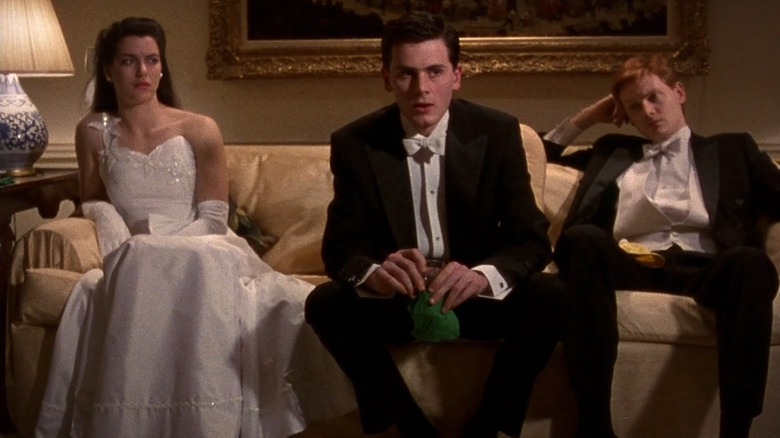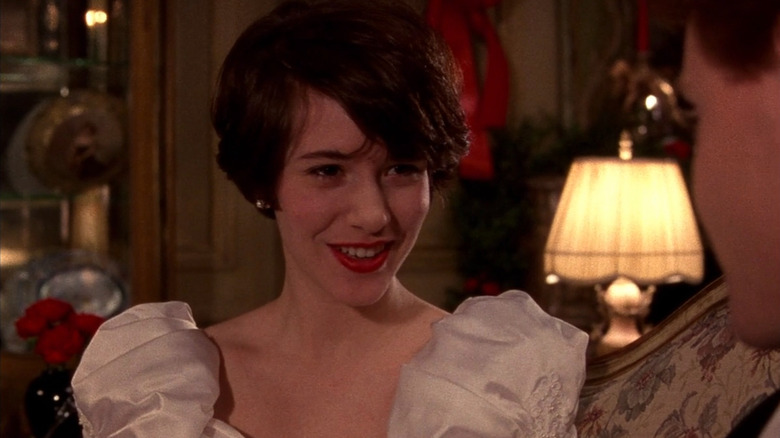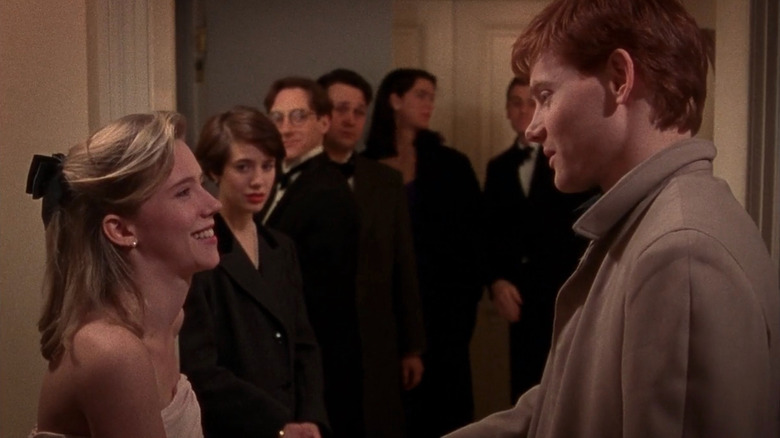The Daily Stream: Metropolitan Takes Aim At The Bourgeoisie And Its Critics
(Welcome to The Daily Stream, an ongoing series in which the /Film team shares what they've been watching, why it's worth checking out, and where you can stream it.)
The Movie: "Metropolitan"
Where You Can Stream It: HBO Max, Criterion Channel
The Pitch: Whit Stillman has built a career on exploring the humor and hypocrisies of the privileged class. Through just five feature films over the last 32 years, he has crafted a collection of prickly egoists enclosed in a social bubble who are just counting down the days before it is popped. His directorial debut, 1990's "Metropolitan," takes aim at the old money, preppy young adults of Manhattan's Upper East Side. Tom Townsend (Edward Clements), a middle-class Upper Westsider, gets entrenched in the world of debutante parties and dances of New York's elite. Though he says he is a socialist and detests the pageantry and attitudes of these events, Tom finds himself drawn into the social circle by the warm, Jane Austen-loving Audrey (Carolyn Farina), the obnoxious, sardonic Nick (Chris Eigeman), and Serena (Ellia Thompson), the girl he has still been pining over even after their breakup. Bringing the two social classes together brings out the ridiculous self-centered pomp and circumstance each one has, as Tom's belief system is every bit as hollow as these friendships created just because of one's class.
Why it's essential viewing
Over the last few years, there has been a rising dialogue about how much empathy the average audience member can generate for a character from excessive economic means. The problems of the wealthy are seen as trivial or unimportant, as these people have the luxury of financial stability to focus on things that are not life and death scenarios. While some filmmakers seem completely unaware of the ivory tower their characters operate in, such as Judd Apatow with "This Is 40," Whit Stillman never lets a second go by without highlighting the total absurdity of these people's lifestyles along with the total pride they take in them.
Stillman regular Taylor Nichols becomes the loudest mouthpiece in this as Charlie, constantly espousing his theories about how the preppy class (or, as he likes to call it, the "Urban Haute Bourgeoisie") has long been denigrated and misinterpreted. He also has a strong feeling that once the era of the deb parties ends, they will be doomed to a life of misery and failure, as they have been completely sheltered from the actual issues of real life. Nichols performs all this philosophizing through a constant stammer, like he was trying to convince himself of his own words just as much as his group of friends. He knows that the notion of him ending up destitute is ridiculous, but it is his way of telling himself that the way he currently lives life is okay.
One would assume Tom would be the one to excoriate the upper class, being the interloper, but Stillman has just as much fun tearing apart his hypocrisies as everyone else's. This is a young college student who, without a hint of irony, asserts he is a socialist in the mold of French philosopher Charles Fourier and will fervently debate Audrey about Jane Austen's "Mansfield Park," despite the fact he has only read literary criticism of the book and not the book itself. He is just as much of an elitist as everyone else at these parties, but he believes himself to be the truth-teller sticking it to the man. Chris Eigeman's Nick is quick to point out how Tom was immediately willing to join this exclusive social circle, "Because he got an invitation." Stillman has fun prodding at everyone's ideologies, and as someone who grew up in these social circles as the son of a politician, he knows all too well where to poke at the conventions without turning the characters into caricatures.
Oh, yeah, and it's hilarious
The thematic and satirical intent on "Metropolitan" is all well and good, but what's a great satire if it isn't also really funny? Luckily, Stillman is truly one of the great writers of wit, one-liners, and punchlines that we have had in the last 50 years. Every line is delivered in complete earnestness, and you never know when the swerve into the totally ridiculous will happen. Bidding adieu to one of your party guests by saying, "Good luck with your Fourierism," cuts me to the point where I have to pause the movie, afraid I will miss the next zinger. Chris Eigeman, another Stillman regular, is clearly the king at delivering these kinds of barbs. He has this voice that just drips with smarminess (in the best way) that perfectly suits the most self-obsessed, callous things Stillman can put to paper. Him delivering lines like, "Our parents' generation was never interested in keeping up standards. They wanted to be happy, but, of course, the last way to be happy is to make it your objective in life," or, "He can't get locked in. I used to have to use those doors when people forgot to invite me to their parties," can't help but make you enjoy this guy who you really shouldn't spend more than five minutes around.
"Metropolitan" serves as the beginning of a thematic trilogy for Stillman, with the next two being 1994's "Barcelona" and 1998's "The Last Days of Disco." Those two films I even prefer to the already terrific "Metropolitan," so once you finish watching this film, go rent those other two. In fact, just check out his other two films "Damsels in Distress" and "Love & Friendship" while you're at it. Not a long filmography. So many people try to do these satires of the elite, but no one comes close to matching Stillman's bite and wit on the subject. This is his domain, and he owns it completely. I know there will be people turned off by the notion of "Metropolitan," as it is a story about people they do not think they can care about, but unless you have seen them in the hands of Whit Stillman, you really haven't seen or laughed at them before like this.


